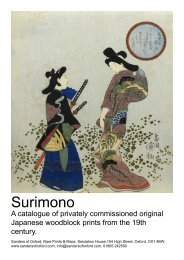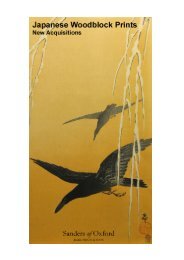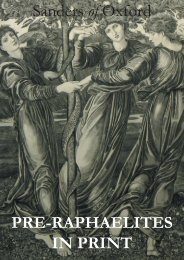You also want an ePaper? Increase the reach of your titles
YUMPU automatically turns print PDFs into web optimized ePapers that Google loves.
Dimensions: 15 x 10 inches<br />
Code: SOX<br />
Price [Mounted]: £200<br />
This relatively rare erotic bijin-ga is one <strong>of</strong> a twelve-print soroimono matching oiran to the<br />
different signs <strong>of</strong> the zodiac and, by extension, to the months <strong>of</strong> the year. Here, representing<br />
the sign <strong>of</strong> the dog or inu, a courtesan is shown tying her koshimaki [lit. ‘hip wrap’ or ‘waist<br />
roll’]. In early modern Japan, women did not wear underclothing: the tight lines <strong>of</strong> the<br />
kosode being ruined by superfluous material. Comprising a two-yard length <strong>of</strong> thin silk, the<br />
koshimaki constituted the most intimate layer <strong>of</strong> clothing and was simply wrapped around<br />
the waist.<br />
23. Utagawa Kunisada (Toyokuni III) (1786-1864)<br />
The Meandering Stream Party [Kyokusui no en or Kyokusui-no-Utage]<br />
Date [Western]: 1852<br />
Date [Japanese]: Sixth Month <strong>of</strong> Kaei 5<br />
Signature: Toyokuni-ga<br />
Zodiacal Date Seal: ne roku/rat 6<br />
Nanushi Censor Seals: Murata [Murata Heiemon] & Muramatsu [Muramatsu<br />
Genroku]<br />
Publisher’s Seal: Mori-ji<br />
School: Utagawa<br />
Method: Nishiki-e woodblock print<br />
Format: Ôban tate-e triptych<br />
Condition: Good, some wear at corners<br />
Dimensions: Each sheet 15 x 10 inches<br />
Code: SOX<br />
Price [Framed]: £500<br />
A mitate or parody <strong>of</strong> rantei kyokusui [Chinese: Lanting qushui] or ‘meandering stream and<br />
orchid pavilion’, a iconographical theme which referred to a gathering held in 353 by the<br />
famous Eastern Jin calligrapher Wang Xishi (Japanese: Ou Gishi [321-79]) at the Orchid<br />
Pavilion (Japanese: Rantei) in Guiji, Zhejiang. In order to celebrate the annual ‘Spring<br />
Purification Festival’ (held on the Third Day <strong>of</strong> the Third Month), Wang Xishi invited fortyone<br />
scholar-poets to engage in poetry and drinking while seated along the bank <strong>of</strong> a winding<br />
rivulet. As an elegant conceit, he arranged for servants to float cups <strong>of</strong> wine down the<br />
stream, and those guests who had not yet written a poem before a cup had passed by were<br />
required to imbibe a penalty cup. The next day, Wang assembled the surprisingly competent<br />
poems <strong>of</strong> his inebriated friends and wrote his famous Lanting jixu (Japanese: Rantei Shûjo)<br />
or ‘Preface to the Orchid Pavilion Compilation’, a melancholy discourse on the meaning <strong>of</strong><br />
life.<br />
The trope became extremely popular in Chinese painting, and was subsequently equally<br />
revered by the Japanese. According to both the Nihon shoki and archaeological remains, a<br />
meandering stream built <strong>of</strong> stones was constructed in the southeast corner <strong>of</strong> the eightcentury<br />
Heijô palace, presumably so that aristocrats could re-enact the ‘meandering stream<br />
party’ (kyokusui-no-en).<br />
Paintings <strong>of</strong> rantei kyokusui typically feature a number <strong>of</strong> erudite gentlemen seated beside a<br />
twisting stream. For Sinophile Japanese painters the theme was symbolic <strong>of</strong> refined scholarly<br />
pleasure and the humour in Kunisada’s work rests heavily on that perceived esoteric<br />
aestheticism.<br />
The triptych wittily and somewhat irreverently depicts one such re-enactment with a group<br />
<strong>of</strong> fashionable 1850s bijin (beautiful women) and an exquisitely dressed samurai carrying a<br />
pipe (probably a pictorial nod towards Prince Genji, although the text does not make this<br />
association explicit); the jovial vulgarity <strong>of</strong> the servants wading in the water possibly<br />
<strong>of</strong>fering an indication <strong>of</strong> Kunisada’s opinion <strong>of</strong> the pretentiousness <strong>of</strong> such gatherings.












